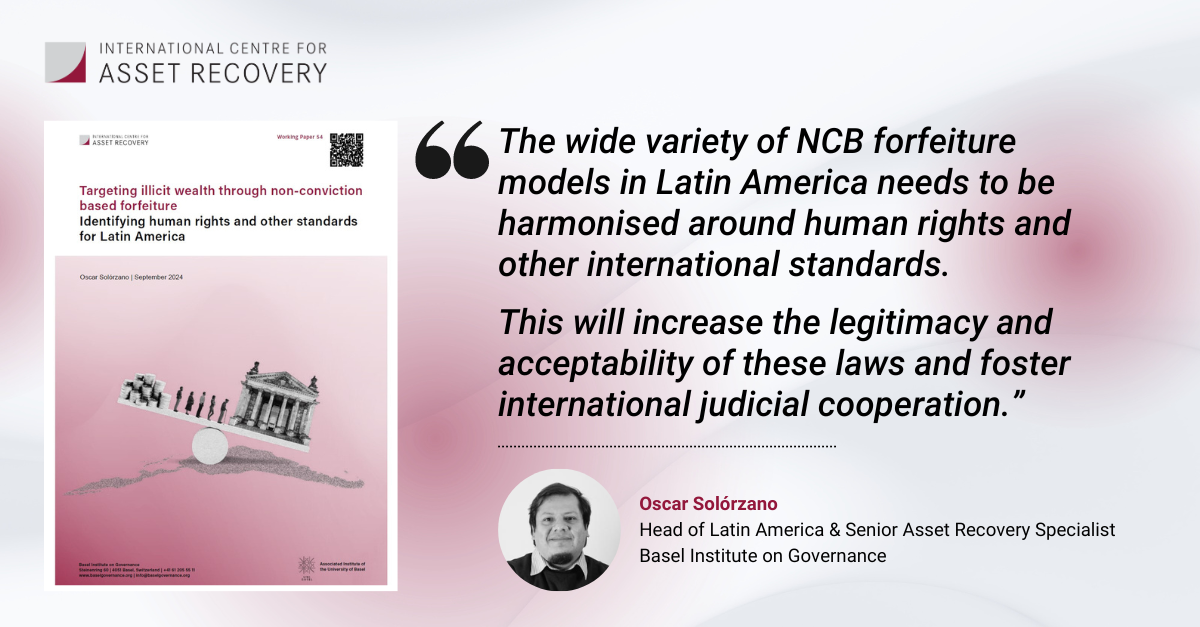New Working Paper spotlights non-conviction based forfeiture in Latin America

Latin America has seen various legislative efforts in the fight against rampant economic and organised crime and in the endeavour to recover illicit assets relating to these crimes. Among theses efforts is a wide variety of non-conviction based (NCB) forfeiture regimes and applicable standards.
NCB forfeiture allows for the recovery of illicit assets autonomously, i.e. outside of criminal proceedings, through an independent judicial process that applies civil rules and is directed against the asset itself (in rem).
In the latest Working Paper published by the Basel Institute on Governance, our Head of Latin America and Senior Asset Recovery Specialist Oscar Solórzano explores the practice of non-conviction based forfeiture in Latin America.
The paper advocates for the adoption of harmonised legislation that is aligned to internationally recognised standards as an effective criminal policy response to pernicious forms of economic crime.
Non-conviction based forfeiture in Latin America
There is a patchwork of NCB forfeiture laws with different scopes and applicable standards in Latin America. The predominant model is called Extinción de dominio law – a concept that so far has no standard translation in English. Initially developed in Colombia’s fight against drug trafficking in the 1990s, the concept has been adopted in many other countries in the region.
While in some instances, Extinción de dominio has facilitated the recovery of immense illicit wealth, asset recovery rates generally remain marginal in Latin America. The paper shows that NCB forfeiture regimes are neither widely accepted nor uniformly applied.
Lack of harmonisation undermines legitimacy
The lack of harmonisation and standardised rules in the area of NCB forfeiture gives rise to doubts about whether these legislations safeguard the affected individuals’ human rights and basic principles of the rule of law.
It also results in limited success in obtaining international judicial cooperation through mutual legal assistance, especially in the international enforcement of confiscation orders. To make matters worse, at the global level there are as yet no binding treaty obligations on states to cooperate in international NCB forfeiture cases.
Alignment with human rights and other standards
The paper argues that, for asset recovery to reach its potential in Latin America, domestic judicial practices of novel mechanisms NCB forfeiture such as Extinción de dominio need to be:
- critically reviewed and harmonised; and
- implemented in accordance with human rights and other international standards and emerging best practices.
Summing up one of the key takeaways in this regard, Oscar Solórzano writes:
“[Fair mechanisms that apply] rules universally recognised by the international community will enhance NCB forfeiture’s credibility and legitimacy and ultimately provide a better balance between criminal policy objectives and the protection of the rights of individuals. In the same vein, the determination of clear and recognised rules should improve international cooperation to recover assets hidden overseas.”
Learn more
Download Working Paper 54: Targeting illicit wealth through non-conviction based forfeiture: Identifying human rights and other standards for Latin America, by Oscar Solórzano.

